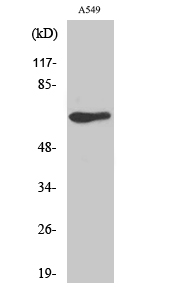
| WB | 咨询技术 | Human,Mouse,Rat |
| IF | 咨询技术 | Human,Mouse,Rat |
| IHC | 咨询技术 | Human,Mouse,Rat |
| ICC | 1/200-1/1000 | Human,Mouse,Rat |
| FCM | 咨询技术 | Human,Mouse,Rat |
| Elisa | 1/10000 | Human,Mouse,Rat |
| Aliases | GPR50; Melatonin-related receptor; G protein-coupled receptor 50; H9 |
| Entrez GeneID | 9248; |
| WB Predicted band size | 68kDa |
| Host/Isotype | Rabbit IgG |
| Antibody Type | Primary antibody |
| Storage | Store at 4°C short term. Aliquot and store at -20°C long term. Avoid freeze/thaw cycles. |
| Species Reactivity | Human |
| Immunogen | Synthesized peptide derived from the Internal region of human GPR50. |
| Formulation | Purified antibody in PBS with 0.05% sodium azide,0.5%BSA and 50% glycerol. |
+ +
以下是关于GPR50抗体的3篇参考文献及其摘要概括:
---
1. **文献名称**: *"Melatonin receptor signalling in the brain of GPR50 knockout mice"*
**作者**: Levoye A, et al.
**摘要**: 本研究利用GPR50特异性抗体,通过免疫组化分析GPR50基因敲除小鼠的脑组织,发现GPR50蛋白在哺乳动物下丘脑中高表达,并证明其与褪黑素受体MT1存在相互作用,可能参与昼夜节律调节。
2. **文献名称**: *"GPR50 is a genetic risk factor for bipolar disorder in a UK population"*
**作者**: Thomson PA, et al.
**摘要**: 通过Western blot和免疫荧光技术,研究团队使用抗体验证GPR50在人类神经元中的表达水平,发现GPR50基因缺失与双相情感障碍的关联性,提示其在精神疾病中的潜在病理机制。
3. **文献名称**: *"The orphan GPR50 receptor regulates energy homeostasis via the ghrelin signaling pathway"*
**作者**: Ivanova EA, et al.
**摘要**: 该研究利用GPR50特异性抗体检测小鼠脂肪组织中的受体表达,揭示GPR50通过调控生长激素促分泌素受体(ghrelin receptor)信号通路影响能量代谢,可能成为肥胖治疗的靶点。
---
以上文献展示了GPR50抗体在神经生物学、精神疾病及代谢研究中的具体应用。如需扩展检索,建议结合关键词“GPR50 antibody validation”或“GPR50 protein localization”进一步筛选。
GPR50 (G protein-coupled receptor 50), also known as the melatonin-related receptor, is an orphan receptor within the G protein-coupled receptor (GPCR) family, sharing homology with melatonin receptors MT₁ and MT₂. Despite structural similarities, GPR50 does not bind melatonin or other known ligands, leaving its endogenous signaling mechanisms unresolved. It is characterized by a unique long intracellular C-terminal domain, which may interact with regulatory proteins to modulate signaling pathways. Predominantly expressed in the brain, particularly the hypothalamus, pituitary, and thalamus, GPR50 has been implicated in circadian rhythm regulation, thermogenesis, and metabolic processes. Studies suggest its involvement in neuroendocrine functions, including thyroid hormone secretion and adaptive thermogenesis via interactions with the type 1 deiodinase enzyme.
GPR50 antibodies are essential tools for investigating its expression, localization, and function. These antibodies are typically developed against specific epitopes, such as the extracellular N-terminal or intracellular C-terminal regions, and validated for applications like Western blotting, immunohistochemistry, or flow cytometry. Research using GPR50 antibodies has linked the receptor to psychiatric disorders (e.g., bipolar disorder, depression) and metabolic syndromes, highlighting its potential as a therapeutic target. However, challenges remain in confirming antibody specificity due to the receptor’s orphan status and sequence similarities with other GPCRs. Robust validation using knockout models or siRNA is critical to ensure reliable experimental outcomes.
×